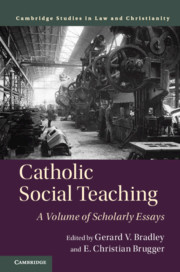Book contents
- Catholic Social Teaching
- Law and Christianity
- Frontispiece
- Catholic Social Teaching
- Copyright page
- Dedication
- Contents
- Contributors
- Acknowledgments
- Abbreviations
- Introduction Contingency, Continuity, Development, and Change in Modern Catholic Social Teaching
- Part I Historical Background
- 1 Aquinas as a Primary Source of Catholic Social Teaching
- 2 The Nineteenth-Century Historical and Intellectual Context of Catholic Social Teaching
- Part II Leo XIII to Francis: The Documentary Tradition
- Part III Themes in Catholic Social Teaching
- Part IV Evaluative and Critical Reflections
- Bibliography
- Index of Names and Subjects
- Index of Ecclesiastical Texts
2 - The Nineteenth-Century Historical and Intellectual Context of Catholic Social Teaching
from Part I - Historical Background
Published online by Cambridge University Press: 12 July 2019
- Catholic Social Teaching
- Law and Christianity
- Frontispiece
- Catholic Social Teaching
- Copyright page
- Dedication
- Contents
- Contributors
- Acknowledgments
- Abbreviations
- Introduction Contingency, Continuity, Development, and Change in Modern Catholic Social Teaching
- Part I Historical Background
- 1 Aquinas as a Primary Source of Catholic Social Teaching
- 2 The Nineteenth-Century Historical and Intellectual Context of Catholic Social Teaching
- Part II Leo XIII to Francis: The Documentary Tradition
- Part III Themes in Catholic Social Teaching
- Part IV Evaluative and Critical Reflections
- Bibliography
- Index of Names and Subjects
- Index of Ecclesiastical Texts
Summary
Modern Catholic Social Teaching (CST) developed in an historical context that posed dramatic challenges to the institutional Church and lay faithful. The French Revolution (1789–1799), the Napoleonic era (1799–1815), and industrial revolution, and waves of succeeding uprisings in 1820, 1830, 1848, and 1870 represented radical challenges to existing political structures, such that Old Regime conceptions of the State and Church alliance of Throne and Altar were no longer tenable. The emergence of the modern secular state in traditionally Catholic lands often included the suppression of religious orders, charitable and educational institutions, and control over clergy and hierarchy. The Church struggled in this revolutionary age of ideology – torn between laissez-faire liberalism and revolutionary socialism. The Catholic movement, primarily of laity, grew in response to these challenges, under the rubrics of the “Religious Question” of freedom of religion, and Church–State relations generally, and of the “Social Question” or how to address the growing number of rootless and impoverished industrial workers in an increasingly secularized political and cultural environment. The revival of neoscholastic philosophy of society became the paradigm through which Pius IX and especially Leo XIII were able to engage modernity on evangelical and natural law foundations.
Keywords
- Type
- Chapter
- Information
- Catholic Social TeachingA Volume of Scholarly Essays, pp. 34 - 66Publisher: Cambridge University PressPrint publication year: 2019
- 1
- Cited by

